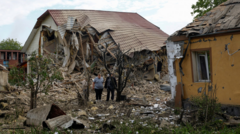The centrist candidates in Romania and Poland achieved significant victories in the recent presidential elections, thereby staving off a feared nationalist advance. However, the results also highlight a broader discontent with the established political parties that may shape the future political landscape in Eastern Europe.
Centrists Resist Nationalist Surge in Eastern Europe Elections

Centrists Resist Nationalist Surge in Eastern Europe Elections
Recent presidential elections in Romania and Poland reveal a temporary setback for nationalist movements, yet underlying discontent with traditional parties remains.
In a turning point for Eastern European politics, recent presidential elections in Romania and Poland demonstrated that centrist candidates can still prevail against the backdrop of rising nationalism. The electoral results, announced on Sunday, were particularly notable in their ability to stop, if not completely reverse, the growing influence of hard-right parties that have gained traction in various parts of the globe.
In Romania, Nicusor Dan, the independent mayor of Bucharest, emerged victorious against George Simion, a nationalist candidate who had garnered significant attention and support. Dan’s win, with 54% of the vote and bolstered by a turnout of 64%, marks a departure from prior predictions that suggested a swing towards the right. Notably, this turnout was considerably higher than the previous round, indicating a mobilization of voters keen on change amidst frustrations with perceived corruption within major political parties.
European leaders, including Ursula von der Leyen, President of the European Commission, expressed satisfaction with the outcomes, interpreting them as a reaffirmation of European values promoting openness, prosperity, and collaborative strength. This perspective aligns with hopes that Romania will steer towards greater integration within the European Union.
Despite these victories for centrist candidates, deeper issues remain. The elections underscore a rising discontent with both mainstream political options, revealing that voters remain wary of established parties regardless of their ideology. This sentiment hints at potential instability and an evolving political landscape across the region, as traditional loyalties fade and new political dynamics come into play.
Similar discontent is evident in Poland, where the electoral climate reflects the same undercurrents of dissatisfaction, driving home the notion that while nationalists might have encountered a setback, the need for political reform and responsiveness persists.
As Romania and Poland navigate this newly evolving political climate, the centrist victories provide an opportunity for reflection and potentially pave the way for addressing the root causes of discontent among their electorates.



















